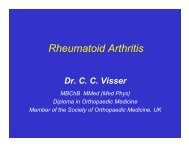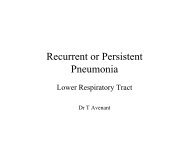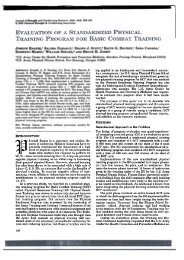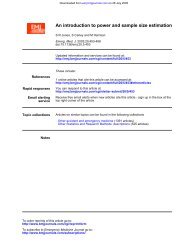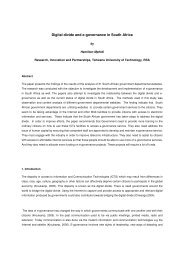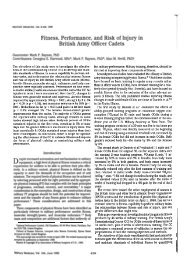NUTRITION INFANCY AND CHILDREN - University of Pretoria
NUTRITION INFANCY AND CHILDREN - University of Pretoria
NUTRITION INFANCY AND CHILDREN - University of Pretoria
Create successful ePaper yourself
Turn your PDF publications into a flip-book with our unique Google optimized e-Paper software.
<strong>INFANCY</strong> <strong>AND</strong> <strong>CHILDREN</strong><br />
11<br />
_____________________________________________________________________________<br />
QUESTIONS ANSWERS<br />
Is it possible for a working mother to<br />
continue breastfeeding her baby? Please<br />
motivate your answer.<br />
A young mother needs to wean her 6<br />
month old baby. Discuss 2 ways to stop<br />
lactation.<br />
7. ALLERGIES <strong>AND</strong> FOOD INTOLERANCE<br />
Copyright © <strong>University</strong> <strong>of</strong> <strong>Pretoria</strong><br />
Yes.<br />
Expressed milk to the daycare center or<br />
formula feed during the day.<br />
Breastfeed during the night.<br />
Decrease breastfeeding over 3-4 days.<br />
Parlodel (Bromocriptine) 1.25 mg bd x14<br />
days.<br />
Allergy is the name given to a wide spectrum <strong>of</strong> diseases <strong>of</strong> clinical conditions, but the<br />
common feature is that they all are caused by the over-production in the patient's immune<br />
system <strong>of</strong> an antibody called IgE. The clinical conditions are most commonly:<br />
� Asthma.<br />
� Eczema.<br />
� Urticaria.<br />
� Rhinitis.<br />
� Hay fever.<br />
� Adverse reactions to food.<br />
� Conjunctivitis.<br />
There are over 400 environmental agents that have been proven to cause allergies.<br />
Allergens which commonly cause allergic symptoms include house dust mites, cats' and<br />
dogs' dander, tree pollens, weed pollens, mould spores, bee venoms, antibiotics (e.g.<br />
penicillins, sulphonamides) and many others.<br />
When a new type <strong>of</strong> food is introduced onto the infant's diet, allergic reactions can develop.<br />
Thus it is important to introduce 1 new foodstuff at a time.<br />
Symptoms <strong>of</strong> allergic reactions:<br />
� Rash.<br />
� Stuffy nose.<br />
� Recurrent otitis media.<br />
� Recurrent lung infections.<br />
� Inadequate weight gain.<br />
� Crying incessantly.<br />
� Sleeping problems.<br />
� Infantile colic.<br />
� Cramps.<br />
� Nausea and vomiting<br />
� Diarrhoea.<br />
� Larynx oedema.<br />
� Urticaria.<br />
� Atopic dermatitis.<br />
As house dust (and thus the house dust mite) is a major cause <strong>of</strong> allergic reactions, it is<br />
important to know how to avoid it. Here are some hints:<br />
� Wash bedding at 60 o C to destroy mites.<br />
� Vacuum the whole house twice a week, vacuum early in the morning and open all the<br />
windows.<br />
� Avoid vacuuming, cleaning or dusting with an asthma sufferer in the room.



